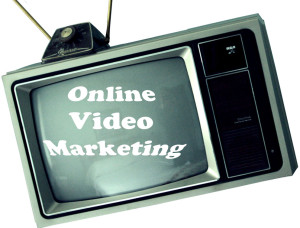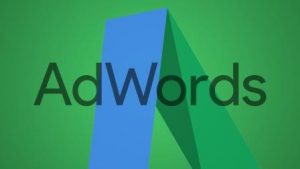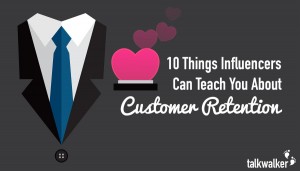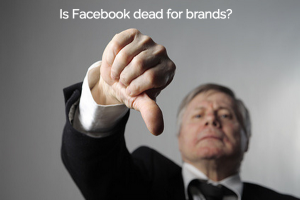
The news about Facebook lately has been pretty grim. The Wall St. Journal recently ran a piece on how smaller brands are seeing sales generated from Facebook in “the lower digits” even on pages with tons of “likes”, and Facebook recently announced that starting January 1 our newsfeeds will see even less of “promotional posts” which include:
- Posts that solely push people to buy a product or install an app
- Posts that push people to enter promotions and sweepstakes with no real context
- Posts that reuse the exact same content from ads
Here’s an example.
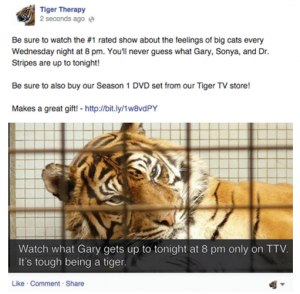
Too pushy? What if I LIKE watching Gary the tiger? Ol’ Gary is going to see a “a significant decrease in distribution” unless he cleans up his act. Even if you have opted in for news from that page you won’t see organic or paid ads for them as often in your newsfeed.
Even brands with deep pockets are feeling the pinch. Ogilvy reported earlier this year that pages with over 500,000 likes are seeing engagement rates plummet to just 2% and that rate is falling by .5% per month. . The Wall St. Journal post focused mostly on small businesses, and they will certainly be hardest hit by the push towards ads because of three factors:
- Lack of resources to create effective ads and optimize them for clicks so you ads convert to the goals you’ve set for your campaign. You need to do the homework to optimize and target your ads effectively. You also need to do a lot of testing, trying multiple ads to see what the formula is for your particular user base and your own goals. This can be challenging for a small business to manage.
- Cost: We see Facebook ads with a typical CPE (Cost Per Engagement) of between $ 0.29 and $ 0.65 on the brands we manage. But cost per engagement is defined by Facebook as “The average cost per action related to your Page’s posts as a result of your ad.” Geez, what does that even mean? Well, what it means is any action taken — Liking, viewing, sharing, commenting and link clicks are all ways to engage with the post.It depends on your goals whether this is useful to you or not. In most cases brands are more interested in cost-per-click and cost-per-lead or cost-per-conversion metrics or developing discussion on their page, so these are the metrics you need to be able to generate.
OK, so we should pay for ads anyway right? Many argue that it’s ridiculous to expect to get a free ride on any online service and I support that. But you can’t tell us it’s all about community and engagement and then stick it to us on organic reach!
On the surface, yes. But when you read numerous reports of click-farm fraud you might want to think again. Click farms are basically sites where people are paid to click the “like” button on a post or page. They often don’t even see or care what the page is about so these users are not engaged on your page and while it is tempting to “up your numbers” it results in a lower engagement ratio and so you show up in newsfeeds LESS. Here’s a great example of how promoting a page through Facebook worked for one brand.
So, what to do?
Facebook recently announced the addition of Facebook Search. Something that on the surface may help businesses be found. IF you search for products on Facebook. Frankly though that’s not the norm for Facebook users. Generally they search for friends and brands they’ve encountered offline to look for deals or special offers at check in. Some serious re-training will need to happen for consumers to start thinking about searching for products and services.
The other option is the most obvious. Use Facebook as just another social media network in your toolbox but not as the be-all end-all of your marketing campaign. Sure, you can promote posts from time to time to appease the Facebook gods, but even promoted posts have a questionable return.
In the end Facebook has to make money and they look at every avenue to do that. I suggest you take a long hard look at how useful this network really is to your brand. Are you getting REAL engagement? Comments and traffic to your website? Sales? Word of mouth? Customer Service? A virtual focus group for product development?
If not you may consider spreading the love a bit more on other networks and on your website. You own your website and no-one can direct how you carry on conversations there.
Digital & Social Articles on Business 2 Community
(370)


